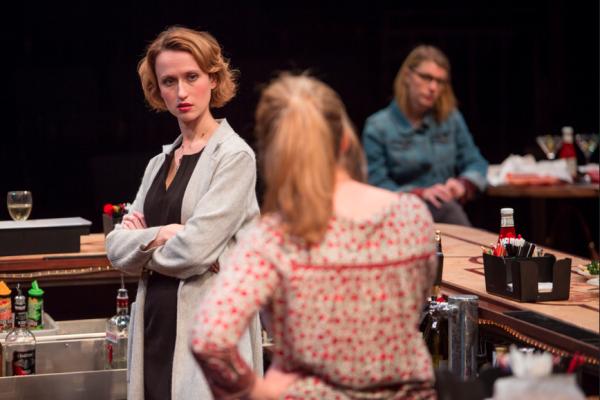Uncivil Discourse: Theresa Rebeck’s ‘The Nest’

Paul Bindel loves food preservation, poetry, and theatre. He lives…
We all like to be right. If you add a little alcohol, the urge to insist, argue, and settle things once and for all becomes irresistible. Theresa Rebeck’s The Nest, one of two plays developed in DCPA’s 2015 Colorado New Play Summit, has all the pontifications you’d expect to hear an hour before last call. But while these rowdy conversations IRL might typically end in a pixilated concession of differences or getting kicked out of the bar, Rebeck’s characters take them further, and the conflict that follows—especially in Lisa Orzolek’s dynamic rotating set—is riveting.
The Crow’s Nest, a dive bar with antique hand-carved woodwork, has lost its customers to the mall up the road. Owners Lila (Laura Letreille) and Nick (David Mason) tend to sodden regulars like wine-lover Margo (Carly Street) and Patrick and Barry, Nick’s drinking buddies played by Brian Dykstra and Brian D. Coats, respectively. At Patrick’s urging, Nick has arranged for an antique appraiser to visit. The only problem is that The Crow’s Nest has been in Lila’s family for years, and she doesn’t want to sell any part of it, especially the bar her great-great-something grandfather reputedly carved.
The opening scene sets the tone for all the events to follow as a date goes from good to bad to terrible, with both mansplainer and shrill-woman stereotypes fully at play. “I don’t think we’re hearing each other,” insists Ned (Kevin Bernston) to his date Irene (Andrea Syglowski), providing a helpful heuristic for the conversations that follow. The characters dig into climate change, war, pandemics, gender in the workplace, gender roles, friendship, and local economies. Director Adrienne Campbell-Holt has made a strong choice by completely removing smartphones from the action; though phones can both contribute and take away from conversation, this bar is interested in people talking, not looking things up.
In the Crow’s Nest, most of the men are oriented toward the future, anxious about their mortalities—whether by virus, by tedium, or by child support claims. Most of the women, meanwhile, are preoccupied with keeping the present going and cleaning up the messes men have made. In fact, Lila actually cleans the bar for most of the intermission. Is a windfall of cash that allows you to explore new possibilities more valuable than caring for and investing in one’s given identity and relationships? These competing orientations don’t remain in gridlock, but they also don’t leave the bar or relationships the same.
Rebeck’s script clearly foregrounds gender, sometimes in broad strokes, but these are drunk folks talking. “It’s worse for women now that [gays] are out of the closet,” Margo claims as she laments the gender dynamics at her job. Patrick latches onto this with a vengeance: “So you hate gay people?” In this and many other issues, though, The Nest does not provide an answer, nor does it crown a winner of any of the debates. What it will give you is something to discuss with your friends after the play, maybe even over a drink.
The Nest plays for one more week at DCPA’s The Space Theatre
What's Your Reaction?
Paul Bindel loves food preservation, poetry, and theatre. He lives in and writes from a housing cooperative in Capitol Hill.




